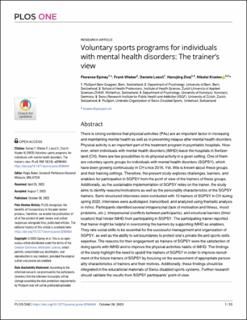Please use this identifier to cite or link to this item:
https://doi.org/10.21256/zhaw-30056Full metadata record
| DC Field | Value | Language |
|---|---|---|
| dc.contributor.author | Epiney, Florence | - |
| dc.contributor.author | Wieber, Frank | - |
| dc.contributor.author | Loosli, Daniela | - |
| dc.contributor.author | Znoj, Hansjörg | - |
| dc.contributor.author | Kiselev, Nikolai | - |
| dc.date.accessioned | 2024-02-29T13:50:51Z | - |
| dc.date.available | 2024-02-29T13:50:51Z | - |
| dc.date.issued | 2023 | - |
| dc.identifier.issn | 1932-6203 | de_CH |
| dc.identifier.uri | https://digitalcollection.zhaw.ch/handle/11475/30056 | - |
| dc.description.abstract | There is strong evidence that physical activities (PAs) are an important factor in increasing and maintaining mental health as well as in preventing relapse after mental health disorders. Physical activity is an important part of the treatment program in psychiatric hospitals. However, when individuals with mental health disorders (IMHD) leave the hospitals in Switzerland (CH), there are few possibilities to do physical activity in a given setting. One of them are voluntary sports groups for individuals with mental health disorders (SGPSY), which have been growing continuously in CH since 2016. Yet, little is known about these groups and their training settings. Therefore, the present study explores challenges, barriers, and enablers for participation in SGPSY from the point of view of the trainers of these groups. Additionally, as the sustainable implementation of SGPSY relies on the trainer, the study aims to identify reasons/motivations as well as the personality characteristics of the SGPSY trainers. Semi-structured interviews were conducted with 15 trainers of SGPSY in CH during spring 2022. Interviews were audiotaped, transcribed, and analyzed using thematic analysis in nVivo. Participants identified several intrapersonal (lack of motivation and fitness, mood problems, etc.), interpersonal (conflicts between participants), and structural barriers (time/location) that hinder IMHD from participating in SGPSY. The participating trainer reported that trainer might be helpful in overcoming the barriers by supporting IMHD as enablers. They rate social skills to be essential for the successful management and organization of SGPSY, as well as the ability to set boundaries to protect one's private life and sports skills expertise. The reasons for their engagement as trainers of SGPSY were the satisfaction of doing sports with IMHD and to improve the physical activities habits of IMHD. The findings of the study highlight the need to upskill the trainers of SGPSY in order to improve recruitment of the future trainers of SGPSY by focusing on the assessment of appropriate personality characteristics of trainers and their motives. Additionally, these findings should be integrated in the educational materials of Swiss disabled sports systems. Further research should validate the results from SGPSY participants' point of view. | de_CH |
| dc.language.iso | en | de_CH |
| dc.publisher | Public Library of Science | de_CH |
| dc.relation.ispartof | PLOS ONE | de_CH |
| dc.rights | http://creativecommons.org/licenses/by/4.0/ | de_CH |
| dc.subject | Humans | de_CH |
| dc.subject | Exercise | de_CH |
| dc.subject | Employment | de_CH |
| dc.subject | Motivation | de_CH |
| dc.subject | Mental health | de_CH |
| dc.subject | Sports | de_CH |
| dc.subject.ddc | 616.89: Psychische Störungen, klinische Psychologie und Psychiatrie | de_CH |
| dc.title | Voluntary sports programs for individuals with mental health disorders : the trainer's view | de_CH |
| dc.type | Beitrag in wissenschaftlicher Zeitschrift | de_CH |
| dcterms.type | Text | de_CH |
| zhaw.departement | Gesundheit | de_CH |
| zhaw.organisationalunit | Institut für Public Health (IPH) | de_CH |
| dc.identifier.doi | 10.1371/journal.pone.0290404 | de_CH |
| dc.identifier.doi | 10.21256/zhaw-30056 | - |
| dc.identifier.pmid | 37883507 | de_CH |
| zhaw.funding.eu | No | de_CH |
| zhaw.issue | 10 | de_CH |
| zhaw.originated.zhaw | Yes | de_CH |
| zhaw.pages.start | e0290404 | de_CH |
| zhaw.publication.status | publishedVersion | de_CH |
| zhaw.volume | 18 | de_CH |
| zhaw.publication.review | Open peer review | de_CH |
| zhaw.webfeed | G: Arbeit und Gesundheit | de_CH |
| zhaw.funding.zhaw | Sport für Menschen mit psychischen Beeinträchtigungen in der Schweiz | de_CH |
| zhaw.author.additional | No | de_CH |
| zhaw.display.portrait | Yes | de_CH |
| Appears in collections: | Publikationen Gesundheit | |
Files in This Item:
| File | Description | Size | Format | |
|---|---|---|---|---|
| 2023_Epiney-etal_Voluntary-sports-programs-mental-health-disorders.pdf | 445.49 kB | Adobe PDF |  View/Open |
Show simple item record
Epiney, F., Wieber, F., Loosli, D., Znoj, H., & Kiselev, N. (2023). Voluntary sports programs for individuals with mental health disorders : the trainer’s view. Plos One, 18(10), e0290404. https://doi.org/10.1371/journal.pone.0290404
Epiney, F. et al. (2023) ‘Voluntary sports programs for individuals with mental health disorders : the trainer’s view’, PLOS ONE, 18(10), p. e0290404. Available at: https://doi.org/10.1371/journal.pone.0290404.
F. Epiney, F. Wieber, D. Loosli, H. Znoj, and N. Kiselev, “Voluntary sports programs for individuals with mental health disorders : the trainer’s view,” PLOS ONE, vol. 18, no. 10, p. e0290404, 2023, doi: 10.1371/journal.pone.0290404.
EPINEY, Florence, Frank WIEBER, Daniela LOOSLI, Hansjörg ZNOJ und Nikolai KISELEV, 2023. Voluntary sports programs for individuals with mental health disorders : the trainer’s view. PLOS ONE. 2023. Bd. 18, Nr. 10, S. e0290404. DOI 10.1371/journal.pone.0290404
Epiney, Florence, Frank Wieber, Daniela Loosli, Hansjörg Znoj, and Nikolai Kiselev. 2023. “Voluntary Sports Programs for Individuals with Mental Health Disorders : The Trainer’s View.” Plos One 18 (10): e0290404. https://doi.org/10.1371/journal.pone.0290404.
Epiney, Florence, et al. “Voluntary Sports Programs for Individuals with Mental Health Disorders : The Trainer’s View.” Plos One, vol. 18, no. 10, 2023, p. e0290404, https://doi.org/10.1371/journal.pone.0290404.
Items in DSpace are protected by copyright, with all rights reserved, unless otherwise indicated.